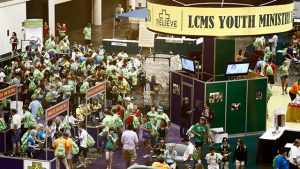The Reporter recently published an article I wrote about 35 years of Lutheran Youth Fellowship Youth Polls. The polls have been taken at each of the triennial Youth Gatherings since the Gatherings started in 1980. Generally, the polls show that LCMS youth are pretty much in line with their families and church. They aren’t taking radical positions on issues and societal trends (the exception being on homosexuality and gay marriage). They come from pretty healthy families (79% of the teens at the 2013 Gathering live with both natural parents compared to 46% of the general teen population). They are 73% pro-life compared to the 73% pro-choice in the general population.

They aren’t perfect, but they tend to be pretty good on religion, faith, family, life issues, etc.
Some have raised the concern that these good responses are for teens who attend the Gathering and cannot be used to describe LCMS teens in general. A pastor said to me that kids at the Gathering have access to family and church resources that many teens cannot access. He suggested that Gathering teens are unique rather than typical.
I agree with him to some extent, but I also see in that truth a challenge. When we look at the data, I see healthy teens for the most part. The reason for their personal and spiritual health is due, in part, to the willingness of family and church to invest in their young people. It doesn’t really make a difference whether the teens go to an LCMS Youth Gathering or another church conference, LCMS Servant Event, LCMS summer camp or a district youth event. It is the reality of the connection of family and church to support, encourage, nurture and love their teens. Family and church create a context in which young people can ask questions, be spiritually fed, engage in service and enjoy one another’s company – in other words, have a good and godly time together.
Christian Smith, who conducted the National Study of Youth and Religion, notes that young people “devoted” to their faith are doing much better than the general population when it comes to positive growth and living. Note what he says from his book, Souls In Transition. Of the faith life of “devoted” young adults (who he describes as “emerging”), Smith writes,
“Emerging adult religion, whatever its depth, character and substance, correlates significantly with, and we think actually often acts as a causal influence producing, what most consider to be more positive outcomes in life for emerging adults. Whether we focus on relationship with parents, giving and volunteering, participation in organized activities, substance abuse, risky behaviors, moral compassion, physical health, bodily self image, mental and emotional well being, locus of control, life satisfaction, life purpose, feeling gratitude, educational achievement, resistant to consumerism, pornography use, or potentially problematic sexual activity, the more religious emerging adults are consistently doing better on these measures then the least (religious) emerging adults.” (Soul’s In Transition, Oxford University Press, 2009)
The challenge then, is how to provide that support for all the kids God has entrusted to our care. When one sees positive data like our youth polls present, why wouldn’t we want that for all our teens? Why aren’t all our congregations and families investing in their young people?
If it is a matter of resources, I believe our congregations have them. It’s time to heed C.F.W. Walther’s encouragement to “serve well the young people of the congregation.” It’s time to invest in our young. That may mean a financial investment. It most certainly means an investment of time by the body of Christ in the form of a local congregation. It means providing a safe place for teens to gather. It means providing opportunity to be nurtured in the faith. It means providing a forum for teens to raise their questions. It means teens can invite their friends to join them at church and if a church doesn’t have teen members (and there are churches that don’t), it means there are adults who invite and encourage teens whether or not they are members.
We should all see ourselves in youth ministry in an intergenerational way so we get to know the teens at church and call them by name. We mentor them and acknowledge them. We may sponsor them and support their fundraisers.
“It takes a village” the old saying goes. In that context, it means we, adults, acknowledge the youth in our neighborhood, the bagger at the grocery store, the young woman who takes our order and makes our sandwich at Subway, and the young man who cuts our yard. It means calling them by name (that’s why they wear name badges) and offer them a complement while you’re at it. One day it may all lead to inviting them to something at church where they learn they are valued and loved by God and by the members of your church. That may one day lead to your church to sponsoring a group of teens to the Youth Gathering. And that may lead to them taking the youth poll and somebody observing that they have access to a church’s resources. And we say, ‘Yes, somebody cared and encouraged them and loved them.”
I can’t tell you why more churches aren’t “resourcing” more. There are few neighborhoods that have no young people. And therein lies the opportunity and the challenge for us aptly stated in Proverbs 22:6, “Train up a child in the way they should go.”